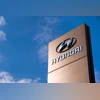Hyundai Motor India (HMIL) had a disappointing trading debut on Tuesday, with shares of the country’s second-largest passenger carmaker ending over 7 per cent below their issue price. This follows tepid demand for the shares during its Rs 27,870 crore initial public offering (IPO) — India’s largest ever — which managed to scrape through with just 2.4 times subscription, primarily driven by demand from institutional investors.
Shares of HMIL finished at Rs 1,820, down Rs 140, or 7.1 per cent, from its issue price of Rs 1,960, valuing the domestic arm of the South Korean automobile (auto) major at Rs 1.48 trillion, down from the IPO valuation of Rs 1.59 trillion. After hitting a low of Rs 1,807 and a high of Rs 1,970, the stock ended at Rs 1,845 on the National Stock Exchange (NSE), where Rs 5,400 crore worth of shares changed hands.
HMIL’s listing day performance was the fifth worst for a Rs 5,000 crore IPO. It joined the ranks of One97 Communications (Paytm) and Life Insurance Corporation of India, which also launched mega offerings, but their listing day performances left a bitter taste in investors’ mouths.
HMIL’s listing day decline was the ninth worst for IPOs in calendar year 2024. Of the 64 mainboard IPOs, only 12 companies have seen losses on their trading debut.
Also Read
“We fully understand the commitment to the shareholders…whether it is in terms of capacity addition, electrification, premiumisation, or cost optimisation. So we believe that, as management, we will continue to pursue this path of shareholder return. Of course, the price will always be determined by the investors,” said Tarun Garg, chief operating officer of HMIL, during the after-listing media briefing.
HMIL’s IPO had seen strong responses from sovereign wealth funds and domestic mutual funds; however, retail and affluent investors sidestepped the issue amid a selloff in auto stocks and overall markets. Also, HMIL’s expensive valuation raised concerns about the stock’s short-term performance. Since HMIL’s IPO opened on October 15, the NSE Nifty 50 and the NSE Nifty Auto indices have declined by 2.6 per cent and 7 per cent, respectively.
Based on its 2023-24 earnings, the stock is valued at 26 times, only 10 per cent lower than the market leader, Maruti Suzuki India (MSIL).
While Hyundai has a superior margin and return profile compared to MSIL, in terms of volumes, market share, and distribution reach, it is still only a third of the market leader.
On the day of listing, several brokerages initiated coverage on HMIL stock, with target prices ranging from Rs 1,750 to Rs 2,345.
A note by Nomura said it expects HMIL to deliver 17 per cent annualised earnings growth and 8 per cent volume growth between 2024-25 and 2026-27 (FY27), driven by seven to eight new models (including facelifts). It has a target price of Rs 2,472 on the stock — 25 times its estimated earnings for FY27.
“We ascribe a slight premium to HMIL over MSIL, given Hyundai Motor Company’s (HMC’s) technological prowess in emerging technologies that can be adapted to domestic requirements; superior financial metrics; a relatively premium brand perception; and better alignment with industry trends,” said Motilal Oswal in a note. It has a target price of Rs 2,345, premised on 27 times September 2026 earnings estimates versus 26 times for MSIL.
Through the IPO, the Seoul-headquartered parent, HMC, divested a 17.5 per cent stake.

)